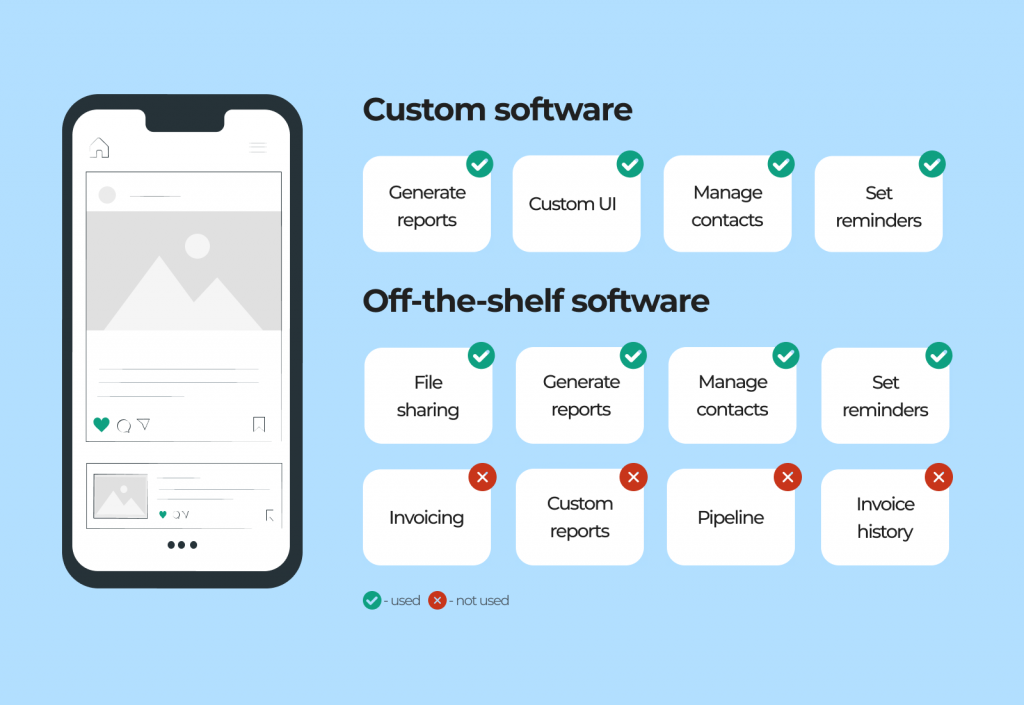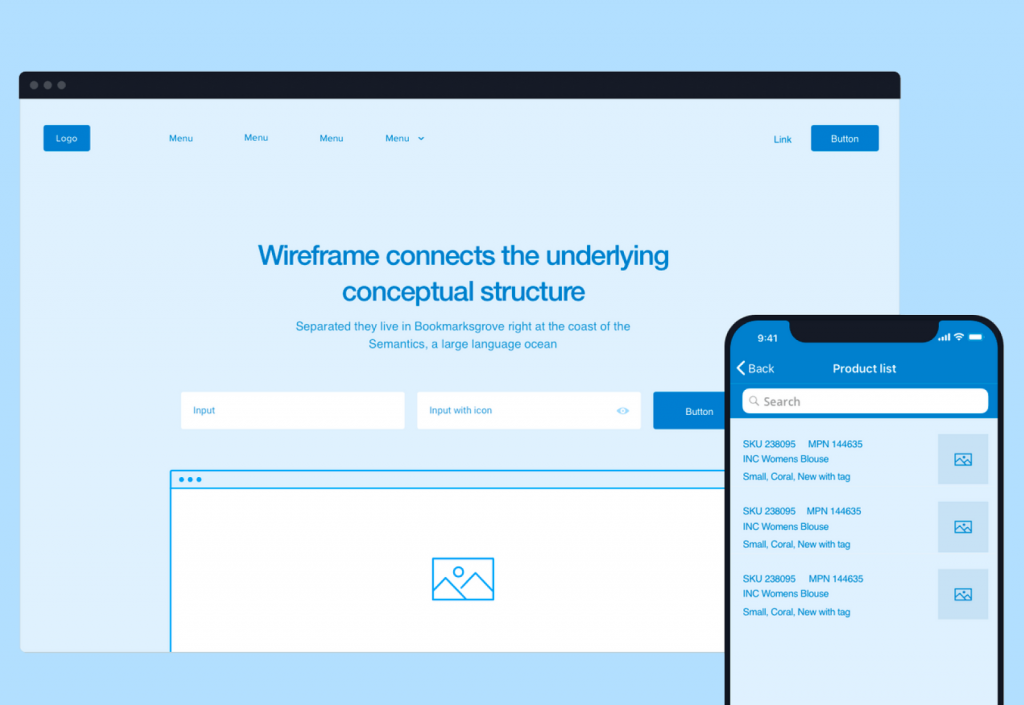
Every business can face the need to rebuild work processes and implement automation. It makes performing many tasks easier and leads to profit and labor productivity rising. To achieve these goals, companies resort to the help of CRM, HRM, and various systems of automating finances, project and inventory management, etc.
But, here, the business faces the question of creating an on-demand IT solution or choosing a ready-made one. To answer, we need to understand what advantages custom software development australia has, how it helps to cope with business tasks, and when it is the better option. From the article, you will learn about it and find out what you need to succeed in creating your own IT solution.
What Is Custom Software and Its Development?
Custom software is a digital product (for instance, web or mobile app) created to satisfy specific consumer’s needs. It isn’t intended for a wide range of clients, as is the case with a ready-made solution, but tailored to the needs of a particular company or enterprise.
A little example: Imagine you run a warehouse and need an app to speed up the movement of goods between racks or help with workflow facilitation. Custom-made software will only serve your staff needs and most likely won’t be used ubiquitously. A ready-made product will be more versatile but may contain some features you won’t use so that you’ll pay for needless functionality.
The same principle applies to app development and design as a whole. Customized UI/UX will fit your customers’ needs exactly: e.g., if you create a medical app for people with ophthalmic problems, designers will pay extra attention to font color and size.
The same thing is with any internal custom software – accounting, ERP, and CRM systems, marketing, management, and business intelligence tools, or other solutions for specific industries.
That’s why it’s so necessary to conduct research before developing a custom product, collect feedback, and define features you need to include in your app (employees’ communication tools, statistics check, etc.).

Usually, a custom software development process looks like that:
- Exploring. A stage of business goals defining, existing solutions studying, and customers’ analysis.
- Planning. Definition of the features the product will contain, the project requirements, and wireframes design.
- Creating a UI/UX design of all the app’s screens.
- Code writing, testing, and bugs elimination.
- Mobile app releasing. Product publishes on stores/web. Then it requires post-release bug-fixing and continuous updating.
Now, let’s consider how custom software compares favorably with ready-made one.
Custom software vs. ready-made solution
Not every company needs a custom product. It doesn’t fit companies that are just going digital or already have well-established business processes. However, if you have a small firm or decide to launch a startup, ready-made software may be enough to succeed.
When the business grows, the off-the-shelf solution no longer meets the new and complicated needs due to limitations (such as lack of integrations with Dropbox or Slack). To solve this issue, you can adapt the ready-made software — for instance, hire developers to integrate CRM with third-party services.
But, ultimately, you’ll understand that solution doesn’t work for your business, but, on the contrary, you adjust your processes for it. As a result, you’ll face wasting time, money and your competitors will get an advantage. Therefore, you have to clearly understand when it’s better to choose an off-the-shelf software and use a custom one. So let’s figure it out.
When to choose an off-the-shelf product:
- There is only the basic stream of tasks (for instance, delivery request getting – registration – goods sending – needed documents printing – finishing).
- You are limited in money and time to build a custom product.
- You are ready to exploit a ready-made solution with limited functionality – and are aware of the consequences.
- You’ve had experience with such software previously, and you’ve created processes based on it.
When the custom software is better:
- A ready-made solution is unsuitable for business processes in your company and worsens them.
- For a product to be integrated with specific services that are not provided in standard solutions (e.g., reporting).
- You choose software with broad functionality, unique and understandable UI, and high UX.
- You wish your software investment to pay off quickly and thoroughly, and every feature is practical and convenient.
Custom software development benefits in more detail
- Money-saving in a long-term outlook
As already noted, ready-made solutions may contain redundant functions. When developing a custom product, you include only necessary and cost-effective functionality and don’t pay for unused things.
- The updates are scaling and planning effortlessly.
Sometimes you just can’t customize ready-made software or adding new features and bug fixing takes too much time and money. But, with a custom solution, you can add the main features first to see if everything works correctly. And even integrate it with other services or add new features without effort and wasting time.
- It takes less time to train staff.
Customized solutions solve particular issues in the company and have only integrations and functions your business needs. Therefore, staff understand tasks and processes better and learn to work in a new system fast.
Teaching to use ready-made software may take more time. For example, take an SAP enterprise platform that completely changes the way you do business: it’s large, compound, and expensive. To customize it, you’ll need SAP consultants (in the USA, they charge an average of $75/hour) and SAP (ABAP) developers for integration ($69/hour).
- Built according to your requirements for safety.
Security is crucial for software, especially when it is a financial one, stores customer data, or requires regulatory compliance (US HIPAA for healthcare).
A ready-made solution doesn’t guarantee individual safety, and choosing a custom development is the best decision. It allows you to select security measures based on your industry.
Cons of custom software development
Custom software development also has some disadvantages:
- The cost of creation is higher, especially in the USA, where the cost varies between $100 and $150/hour, and in Western Europe, it starts from $50 to $150/hour. For example, it may take $30,000-$300,000 to build crm software. There is a way to save money without losing quality: contact developers from Eastern Europe, whose rates are lower and the professionalism is high.
- More time to create. You can’t just build custom software and start using it right away. The development can take months and even more if it’s a complex solution with integrations, custom UI, and unrepeatable features. Implementation can be accelerated with the help of an experienced software company, whose processes are debugged and the development speed is high.
Things to do before develop a custom product
Want to create good, comprehensive software? Here’s what you need to do before starting development:
- Define project objectives and features distinctly.
Before you start to search developers, determine the features to include in your software, its necessary integrations with services, number of users of your product, UI/UX requirements if needed, a platform (Android, iOS, or Windows), etc.
- Hire a competent software development team.
To create custom software, you can involve your own team if they are qualified and have enough competence and time. You can also hire outsource software engineers (Europe, Asia, and Latin America are popular regions for that) or look for developers on a platform like GoodFirms or Clutch.
- Learn the process of custom software building.
Whether your internal developers are working on a project, an IT consulting company, or an outsourcing team, you must draw up a detailed specification of your project. Define a clear plan of development and prescribe exactly how much time it needs to create custom software.

Summing up
Custom software is certainly a suitable option if you are a large business owner because sooner or later, the ready-made software will stop being an answer to all the business questions. In the case of using a custom product, you won’t face this issue and will have the ability to add necessary functionality, integrations, etc., at any time.
Just remember: before developing, consult with experienced tech solutions providers. They’ll help find out about the tech stack, architecture, security, a rough cost, and time estimate to develop and get started!



